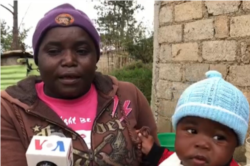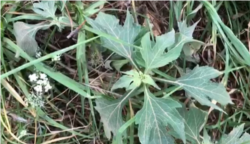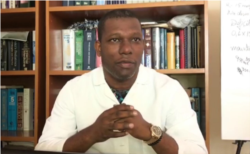FURCY, HAITI - About an hour’s drive from Haiti’s capital, Port-au-Prince, residents of Furcy, a cool, lush, agricultural community high up in the mountains, say they are used to dealing with illnesses common to cooler climates. Their community is located more than 1,000 meters above sea level and average temperatures there during the month of April are around 20 degrees Celsius. Comparatively, in the capital, the average temperature is near 30 degrees Celsius.
The residents say they are now using their herbal cold and flu remedies in their homemade plan to deal with the coronavirus. They had to come up with a plan of action they say, because the government has ignored them.
“The symptoms caused by coronavirus are things we are used to dealing with up here,” a woman wearing a hoodie and a wool hat told VOA Creole. “We’re used to the flu, headaches, sore throats; they are all familiar to us. We do take precautions of course, but we can say we own this type of illness because we live in a cold climate.”
“I know what to make for my children to protect them from illness,” a woman cradling a baby on her hip said. “Back in the day, the old people used to give their children medicine before medicating themselves.”
Remedies to fight flu symptoms
Favorite local remedies to fight flu-like symptoms include a concoction made with cat tail plants, various leaves and ginger root.
“There’s bitter ginger and there’s sweet ginger. To calm a cough, we have our own remedies, so we don’t need to go see a doctor,” the woman with the baby said.
Residents told VOA they are wary of consulting a doctor when they have flu-like symptoms.
“You know it’s a saga to get the doctor to come all the way up here,” a man wearing a patchwork face mask said. “By the time they get their protective gear, instruments and drive up here, we could die.”
Instead, he said, they have decided to take a pragmatic approach.
“We have these leaves over here,” he said pointing to a green leafy plant. “These are sunflower leaves, but to us they are also medicine. They are really bitter, but when we have a cold or the flu, we boil these leaves. We also use it to get rid of fever.”
The man said the locals have various other herbal remedies in their arsenal that are quite effective. He also said they consume limes and bitter oranges, two fruits loaded with Vitamin C, which can boost the immune system.
Fact or fake?
VOA Creole asked Pierre Hugues Saint-Jean, president of Haiti’s National Association of Pharmacists, if there’s any validity to the traditional remedies being touted by people in rural communities.
“There actually has been a debate about the virtues of certain plants. Some people say ginger, others say limes, some people are talking about aloe,” Saint-Jean said. “Just because it’s a plant doesn’t mean it has no scientific validity. But you have to study the plant, isolate the active substances contained in the plant and then conduct (scientific) studies.”
Saint-Jean said this kind of in-depth study can determine what preventive attributes the plant may hold that perhaps later could be used to treat illnesses.
Living in isolation
Although Furcy is only 38 kilometers southeast of the capital, the road to get there is steep and winding, so not many people venture there.
“We don’t go down to Port-au-Prince, so if we need something, someone has to bring it to us,” the man wearing the patchwork face mask told VOA. “No one has come to inform us about the virus or tell us what we should and shouldn’t do. We learned all about it while listening to the radio.”
Another man, who was not wearing a face mask, agreed.
“We just listen to the radio and follow the advice,” he said. Asked why he chose not to wear a face covering, the man said it’s because he finds it difficult to breathe when he has it on.
“I have to get used to it,” he said. “I know it will protect me.”
Residents whom VOA interviewed knew that keeping hands clean is also key to staying healthy. So, they found a way to make that happen.
“Since we live on a mountain, we take many precautions,” said a woman whose baby was wearing a light blue wool hat. “We wash our hands often; if we are going out, we always have a bottle of vinegar in our pocket (that we use as a disinfectant) because way up here, it’s hard to find alcohol but we can easily find vinegar,” she told VOA Creole.
The woman said she stays home most days and doesn’t have contact with many people.
Haiti currently has 58 confirmed cases of the coronavirus, according to the Johns Hopkins University, which is tracking the global outbreak. Of those 58, four people have died and there have been no recoveries.
Prime Minister Joseph Jouthe announced this week that a lockdown that began in March has been extended until May 19.










